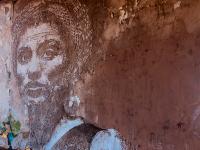Interwinings: peripheral arts
Articles tagged with Interwinings: peripheral arts
Tag Archive
- African Americans
- afro-music
- angolana music
- António Pinto Ribeiro
- antropologist
- arabes
- Architecture Biennial
- Artafrica
- arte rupestre
- Australia
- autonomy
- biblioteca
- Biodiversity
- biography
- black film festival
- black music
- bodies
- Calouste Gulbenkian Foundation
- casas
- Celeiro
- Ceramics
- Circulation; Symbolic Ethnicity; Emotional Communities; Invention of Tradition; Memory of Place; Transculturalism
- citizenship
- Cláudia Simões
- colóquio
- comunidade
- descolinizar museus
- design
- Diálogos com Ruy Duarte de Carvalho
- Dockanema
- drawing
- europa oxalá
- Exhibition
- Fernando Anuang´a
- forgetting
- geopolitics
- ghana
- guerra civil
- Guiné Bissao
- hip hop
- história
- human rights
- humanity
- impasse
- in transit
- international relations
- interpretação do Brasil
- jean rouch
- Jean-Yves Loude
- Jeane terra
- lendas
- luso-afro cinema
- lusotropicalism
- mar
- Margaret stevens
- Mayra Andrade
- menstruation
- mental health
- mexican
- migrants
- Migration and Development
- Moçâmedes
- moral economy
- myth
- naming practices
- Negritude
- Ngola Ritmos
- ngorongoro
- Nina Simone
- nomadism
- Octavia Butler
- Paulo Kapela
- pintura
- portland
- postcolonial
- practices of resistance
- public debate
- racialized
- reflecting Achille Mbembe
- René Tavares
- representativity
- rurality
- Ruy Duarte de Carvalho
- safari
- Sérgio Afonso
- sexuality
- social inclusion
- soil
- south african
- Steve Paxton
- Terra Batida
- Tervuren
- the end
- tourism
- tunisia
- United States
- vodou
- war
- We’re still here
- “Sexual Misconduct in Academia”
 The neologism “artivism” was coined in the 1960s to describe demonstrations against the Vietnam War, as well as student movements and counter-culture. The situationist Guy Debord theorized this conjuncture in his book “The Society of the Spectacle” (1967), in which he argued that it was necessary to overcome existing modes of politics and art, to sabotage the demands of capitalism and to find new modes of art and life. The term reappeared only in the mid-1990s, with the internet revolution, as part of a critical lexicon to describe not only the practice of political art, but also to interrogate what counted as politics and art. In that context, the fundamental question was the transformation of capital into a spectacle, and subsequent artistic problematics.
The neologism “artivism” was coined in the 1960s to describe demonstrations against the Vietnam War, as well as student movements and counter-culture. The situationist Guy Debord theorized this conjuncture in his book “The Society of the Spectacle” (1967), in which he argued that it was necessary to overcome existing modes of politics and art, to sabotage the demands of capitalism and to find new modes of art and life. The term reappeared only in the mid-1990s, with the internet revolution, as part of a critical lexicon to describe not only the practice of political art, but also to interrogate what counted as politics and art. In that context, the fundamental question was the transformation of capital into a spectacle, and subsequent artistic problematics. 